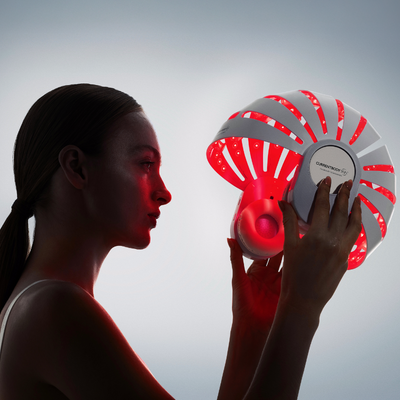Menopause doesn’t just affect sleep and mood. It can also have a significant impact on your face and skin. From spot flare-ups and red, sensitive skin to age spots and thinning hair, hormonal changes can transform your complexion.
Aesthetic expert Dr. Sophie Shotter shares practical tips and treatments, including red light therapy for menopause, to help you maintain healthy, radiant skin.
What is Menopause?
It’s only in recent years that we’ve all been talking more openly about the menopause, so if you’re not totally sure about the ins and outs of this hormonal change, you’re probably not the only one. Understanding it is key to making sense of menopause changes that can happen to your face and skin.
“The menopause is a single day of your life, it’s the day where you haven’t had a period for one year. The time of hormone fluctuation and decline before this is called perimenopause, and the phase of a woman’s life after menopause is called post-menopause. During perimenopause, hormone levels can fluctuate wildly, which is why symptoms usually come and go. Some symptoms do last beyond this period of flux. For example, many women find their sleep is never as good post-menopause as it was pre-menopause. However, the impact of this steady period of hormonal decline gets progressively worse when it comes to the skin and hair,”
— Dr. Shotter, MBChB BSc (Hons) MBCAMea
To break it down simply:
- Menopause itself is just one day, marked by 12 months since your final period.
- Perimenopause is the years before, when hormone levels fluctuate and symptoms often appear.
- Post-menopause refers to the years after menopause, when hormones remain low and some symptoms persist.
- Symptoms can affect everything from sleep to skin and hair, and may last well beyond menopause.
“The entire process where a woman experiences significant symptoms can take around 10 years. There will be a lot of variation between women, and not every woman experiences severe symptoms,” Dr. Shotter adds.
Sadly, it’s an inevitable part of ageing, but thankfully, when it comes to the impact the menopause has on the skin, there’s lots that can be done to help you feel like you again.
Hormonal changes and menopause face symptoms
Not only do you have to contend with irritability, difficulty sleeping, night sweats, and hot flushes in the lead-up to menopause and beyond, but the hormonal shifts. Namely a major decrease in oestrogen, also resulting in significant changes to the health of our skin.
“Skin cells have numerous hormone receptors, so when there’s a significant decrease in circulating hormones, these receptors are no longer ‘fired up’ and can have consequences for the skin. Collagen levels decline rapidly, and the loss of oestrogen can greatly impact skin barrier health. Pigment production can go into overdrive, and for some women, their hormonal imbalances mean that they become androgen-dominant. This shift can lead to excess sebum production, breakouts and even hair loss.”
— Dr. Shotter
Common menopause face symptoms include:
- Redness and flushing
- Dryness and dullness
- Breakouts along the jawline and chin
- Fine lines, sagging, and crepey skin
- Dark spots and uneven pigmentation

Dealing with menopausal breakouts
Menopausal spots often appears along the jawline and lower face. These flare-ups are triggered by fluctuating hormones, stress, and a slowing skin renewal cycle, making them particularly stubborn.
‘When oestrogen levels drop dramatically compared to levels of testosterone and progesterone, overproduction of sebum can ensue, and spots to develop. Ultimately, helping to balance hormones will be the best solution for women who can and are keen to take hormone replacement therapy (HRT). Plus, sometimes even topical HRT formulations for the face containing oestrogen can help balance out sebum production,”
— Dr. Shotter
However, adjusting your skincare activities and practices is also worth adjusting to accommodate this change.
“Salicylic acid and retinoids help reduce oil production. While excellent in-clinic options like chemical peels and AviClear, the laser treatment that targets the sebaceous gland to suppress sebum production are worth giving a go.” says Dr. Shotter, who’s also a fan of blue light therapy.
For at-home care, blue light therapy masks are a solution you should try. Blue light targets blemish-causing bacteria while calming redness and breakouts.
To discover why it’s such a powerful ally for clearer skin, read our blog on the benefits of blue light therapy.

How can you replenish collagen during menopause?
You may need to brace yourself before hearing that collagen levels decline very rapidly pre-menopause. In fact, women lose around 30% of their collagen within the first 5 years of perimenopause, according to dermatologist Leslie Baumann M.D. in Science Direct.
This leads to a loss of firmness, laxity, crepiness and fine lines and wrinkles. And if you haven’t been collagen banking over the years, don't worry. It’s never too late to build and maintain your skin’s collagen stores.
“To replenish collagen stores and firm up the skin, I recommend collagen-stimulating peptides. They are a great option and suitable for all women, including those with increased skin sensitivity during perimenopause. Retinoids can also be very beneficial for those who can tolerate them. In-clinic treatments like Sofwave, a personal favourite, use ultrasound to heat the dermis and stimulate collagen production to redefine the contours of the face and target sagging.”
— Dr. Shotter
For at-home collagen support, red light therapy is one of the most effective options. The CurrentBody Red Light LED Mask, uses clinically proven wavelengths to firm skin, smooth fine lines, and stimulate new collagen production.
If you prefer a clinic-style lift that is also non-invasive, the CurrentBody RF Radio Frequency Skin Tightening Device, heats the dermis to boost collagen and tighten loose skin, with 89% of users seeing improvement in just eight weeks.
Hair loss and menopausal hair changes
Hair loss on the head can be the result of both a decline in oestrogen levels and a relative increase in androgen levels. Add into the mix, thyroid hormone levels becoming disrupted in perimenopause, and you have the perfect hormonal storm that can leave you with an overall decrease in density, thinning of your centre parting, or hair loss around the temples.
“I recommend checking micronutrients (Vitamin D, B12, Iron, Folate) and hormone levels. We also use a DNA test called Trichotest to guide any prescription topical treatments, including oestrogen, prostaglandins, Minoxidil, or Finasteride depending on individual needs.”
— Dr. Shotter
In-clinic, growth factors or exosomes combined with microneedling help stimulate regrowth. At home, the CurrentBody LED Hair Growth Helmet, uses red light to increase hair growth by up to 128% in 12 weeks, thickening and densifying hair.

Menopause and dry skin: How to restore your skin barrier
Our skin acts like a barrier protecting our organs, but what protects our skin? That would be our skin barrier, which stops the skin from losing water and protects it against toxins, harmful bacteria, viruses and allergens.
Rather irritatingly, the levels of lipids (which play an essential role in the skin's barrier function), namely keeping skin well hydrated, decreases during perimenopause. So, does the production of hydrating hyaluronic acid. This can lead to dry, dehydrated, dull-looking complexions.
“Not only that, because the skin barrier is more fragile, skin will often become more reactive in perimenopause, and in extreme cases, rosacea can also develop,” reveals Dr. Shotter. This makes barrier repair, support and added hydration key for menopausal skin.
If rosacea is a concern for you, read our blog on rosacea and how light therapy can help.
“A good approach will be to include a hyaluronic acid-based serum and nourishing, lipid-rich moisturisers into your daily skincare routine. Taking a hyaluronic acid supplement like the EverNutri EverHydra is also beneficial.”
— Dr. Shotter
To up the ante, add the CurrentBody Hydrogel Face Mask to your arsenal, and use the hyaluronic acid-packed mask weekly to ensure you sport a plump, radiant, healthy complexion.
Dealing with menopause skin pigmentation changes
Hormonal changes during menopause can make menopause pigmentation issues like age spots and melasma more noticeable, as thinner skin reacts more strongly to UV exposure.
“Age spots can appear more dramatically and abundantly in perimenopause, as the skin thins and also seems to react more dramatically to UV exposure. Melasma can also present in perimenopause, particularly in women on HRT. I would add pigment-suppressing ingredients like cysteamine to your at-home skincare routine to combat this.”
— Dr. Shotter
Daily SPF on all areas exposed to UV is also a must if you want to reduce further the possibility of developing age spots. And don’t skip the hands, as they tend to show your age, and age spots are prevalent in this zone of the body.
Cue the CurrentBody LED Hand Mask, combining red and near-infrared wavelengths to target hyperpigmentation, firm the skin, and reduce fine lines and wrinkles, helping combat skin pigmentation changes during menopause and giving your hands a youthful glow.

Does red light therapy help with menopause?
Yes. Red light therapy energises skin cells, encourages repair, reduces inflammation, and boosts collagen. This makes it a gentle, science-backed solution for:
- Reducing redness and irritation
- Firming and plumping the skin
- Supporting collagen production
- Encouraging hair regrowth
Whether your goal is clearer skin, firmer contours, or thicker hair, red light therapy is a versatile addition to your menopausal skincare toolkit.
Take control of your menopausal skin and hair
Menopause doesn’t have to mean giving up on healthy, radiant skin or strong, full hair. While hormonal shifts bring their fair share of challenges, there are plenty of ways to support your skin and hair at home and in-clinic.
From targeted skincare and supplements to clinically backed treatments like blue and red light therapy or radiofrequency devices, you can take control of your skin’s health and feel like yourself again.
Remember, every woman’s journey is unique, so finding the combination that works for you is key. Menopause might change your body, but it doesn’t have to change your confidence.





